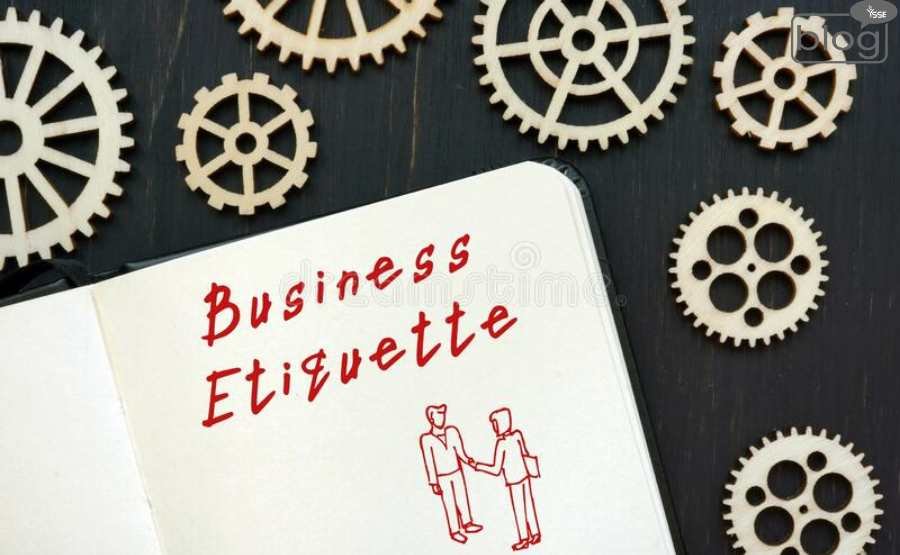Human beings are complex social animals.
We cannot get along by ourselves; we need other members of our species around.
Etiquette and manners help keep us from hurting each other so we can remain together.
Creating a dynamic self-introduction, introducing others, improving listening skills,wearing proper business attire, using correct grammar, and good telephone etiquette all contribute to first-class professional communication.
Remember, etiquette is about more than being courteous.
The tone and manner of how you communicate could determine whether you win, lose, satisfy or disappoint the person on the other side.
ETIQUETTE AND MANNERS
Etiquette and manners have been around as long as man has been here. There is evidence of this in even the most primitive of tribes and groups of people in the vast, far reaches of the world.
Etiquette or manners expected in any group, are the social rules that we live by in order to show respect to others and ourselves.
Professional etiquette builds leadership, quality, business and careers.
According to the Oxford dictionary,etiquette is the conventional rules of personal behavior in polite society. It is about being well-mannered, courteous and showing respect for each other.
Etiquette is a set of rules dealing with exterior form.
Manners are an expression of inner character.
A manner is a way of doing something. The way in which any individual behaves is described generally as his manner. You often see phrases such as “He has the manner of a gentleman”. It describes a person’s bearing as well as behavior.
Manners are common sense, a combination of generosity of spirit and specific know-how.
Rules of etiquette are the guiding codes that enable us to practice manners.
Differences Between Etiquette And Manners
Both etiquette and manners play a significant role in social interactions.
However,the two are different at their core and shouldn’t be confused with each other.
Etiquette is a code of conduct and a set of societal rules that acts as a catalyst for positive human interactions.
On the other hand, manners are behaviors that reflect a person’s attitude.
A key difference between etiquette and manners is that the former changes with a change in societal customs and norms, while the latter remains largely unchanged across communities.
Etiquette provides a structure within which good manners can flourish.
It’s good manners to follow proper etiquette.
For example, etiquette may dictate the rules of talking to someone.
“In some cultures, this means introducing yourself properly to a stranger and shaking their hand.
But in other cultures, shaking hands is frowned upon. Good manners will prompt you to say ‘Please’ Or ‘Thank You’ when needed and not interrupt another person. These are universal courtesies.”
Learn Some Basic Professional Etiquettes & Manners
✅ Show up on time
✅ Good manners are always in style:
It is important to be polite, no matter who you are speaking to.
✅ Get to the point:
You should always be prepared with what you want to say.
You might want to perfect your communications skills to gain confidence for presentations and active conversations.
✅ Put people at the core of communications:
In most cases,your success depends on how you convey your message as well as how the receiver understands it.
✅ Give credit where and when it’s deserved:
There are times when you are stumped for ideas and a colleague offers a brilliant one.
On such occasions,make sure to credit them for their valuable inputs.
Sitting back and taking the credit for yourself without acknowledging others creates resentment.
✅ Choose your words wisely:
Being a good listener is often better than speaking.
You shouldn’t have to share your opinion on every topic that you don’t know about.
✅ Think things out before you speak:
Think your words wisely before you speak.
You should not use awkward words such as“um” “ers” etc. in a sentence and speak more confidently and practice speaking in front of a mirror if needed.
✅ Don’t speak loudly:
If you speak rudely it will be seen as rude and overbearing.
It can also make people angry and as well as upset.
✅ Using the terms ‘Thank You’ and ‘You are Welcome’ shows that you have good manners.
✅ Hold open a door
✅ Do not swear to use filth language and curse words:
It is unprofessional! People who do this are usually very immature and have no self-control or respect for themselves and others!
Etiquette is a set of rules defining the manner in which certain events or situations should be performed. Thus, etiquette defines good manners.
If an individual always performs certain acts in a certain way, then that is described as a mannerism – an individual characteristic.
In summary, Etiquette is the set of rules, Manners are the actions.
It is good manners to follow the proper etiquette for any situation.
Good manners and proper etiquette not only help you develop personal relationships but also help strengthen your professional relationships.
You can leave lasting impressions on your coworkers and clients when you know how to present the best version of yourself.
To read more blogs,click here
Writer
Kulsuma Bahar Bethi
Content Writing Intern
YSSE

